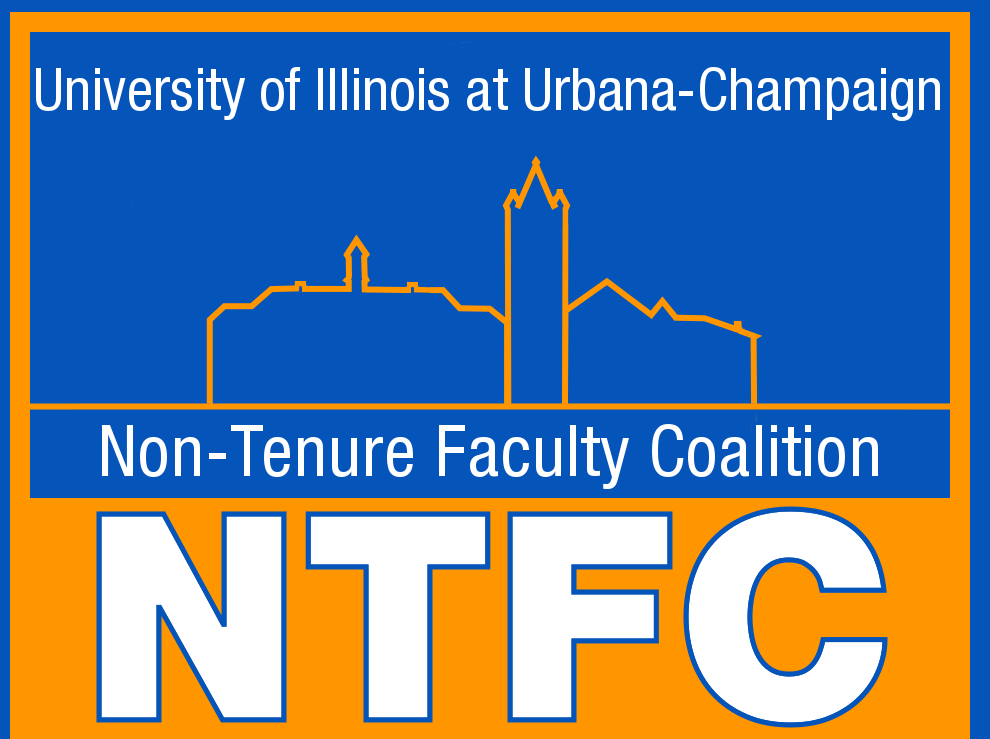Last Wednesday, members of a union representing hundreds of University of Illinois faculty sat down across the table from university negotiators for their twenty-sixth bargaining session. The union’s goal, as it has been for the more than 500 days that they have worked without a contract, was to make progress on an accord that ensures fair wages, due process, and basic respect for non-tenure track faculty. At the end of the session, with no new headway made, the parties agreed to bring in a mediator.
Non-Tenure Faculty Coalition (NTFC) Local 6546 is one of a growing number of unions across the country that represent professors who are excluded from the system of job security that has long been a hallmark of the academic enterprise: tenure. Members of NTFC 6546, who teach essential classes in departments across campus, work on a year-to-year basis and are often left wondering if they will be re-hired until the very last minute. This arrangement creates extraordinary stress and anxiety, turns basic life decisions like signing a lease into risky acts of blind faith, and jeopardizes student learning.
Think about it — would you prefer that your professor had been given three months or three days notice that they would be teaching your class? Along with working out a more equitable system of appointment notification, one of the main issues on the table is the possibility of multi-year contracts for non-tenure track faculty.
Some shortsighted observers will no doubt point to the state budget crisis as evidence that this is a bad time for a public university to give any ground at the bargaining table. Indeed, the budget stalemate in Springfield casts a growing shadow over the very future of public higher education in the state of Illinois.
Layoffs are sweeping multiple campuses, thousands of students are being deprived of promised financial aid, and Chicago State University is on the brink of closure. UIUC has so far been spared the cuts experienced on other campuses, but our future, too, seems full of question marks.
It would be an enormous mistake to allow the current climate of political and budgetary attacks on higher education to stand in the way of forging new campus agreements and collaborations that help advance the fundamental educational mission of our great university.
Furthermore, the NTFC negotiations present the University of Illinois with an opportunity to embark on a new era of labor peace and partnership. Collaborating on speedy, amicable, and fair agreements with campus unions would set a new tone, and would signal to stakeholders across Illinois that our university is prepared to help lead the state out of the rancorous mess in which we find ourselves.
Call me a crazy optimist, but I see reason to be hopeful about forging new agreements, both on campus and in Springfield. UI president Timothy Killeen has rightly called for a new approach to state funding for the university. Noting the irreplaceable value that outstanding public higher education brings to our state, and the deleterious impacts of budget uncertainty, President Killeen has proposed a multi-year budgetary compact with lawmakers.
In exchange for a reprieve from annual fiscal uncertainty, the university would agree to meet new benchmarks, in areas such as capping tuition costs and improving graduate rates. The devil, as always, will be in the details. But the framework of a multi-year compact suggests a fresh model of partnership built on the shared goal of advancing the public good.
One of the potential benefits of such a compact would be the model that it could provide for collective bargaining on the Urbana campus. It would show the value of choosing partnership and fair compromise over stalemate and division. Indeed, just as our state would be well served by a stable and thriving University of Illinois, our students would benefit from a labor agreement that provides job security for their teachers.








